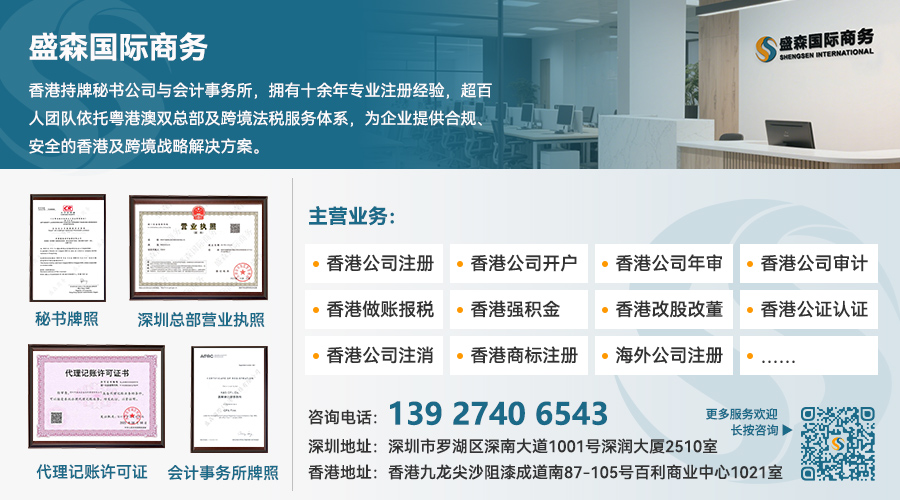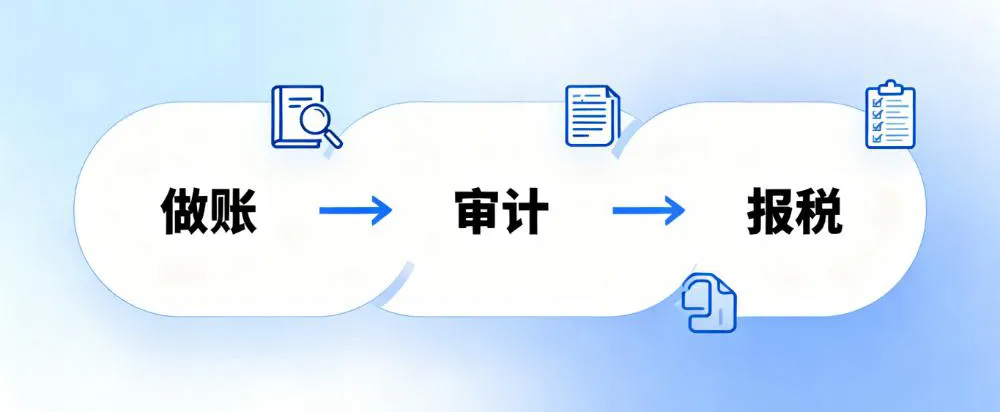2025 Hong Kong Offshore Exemption New Regulations Compliance Guide: Tax-saving Logic, Application Requirements and Full Process Practical Operations
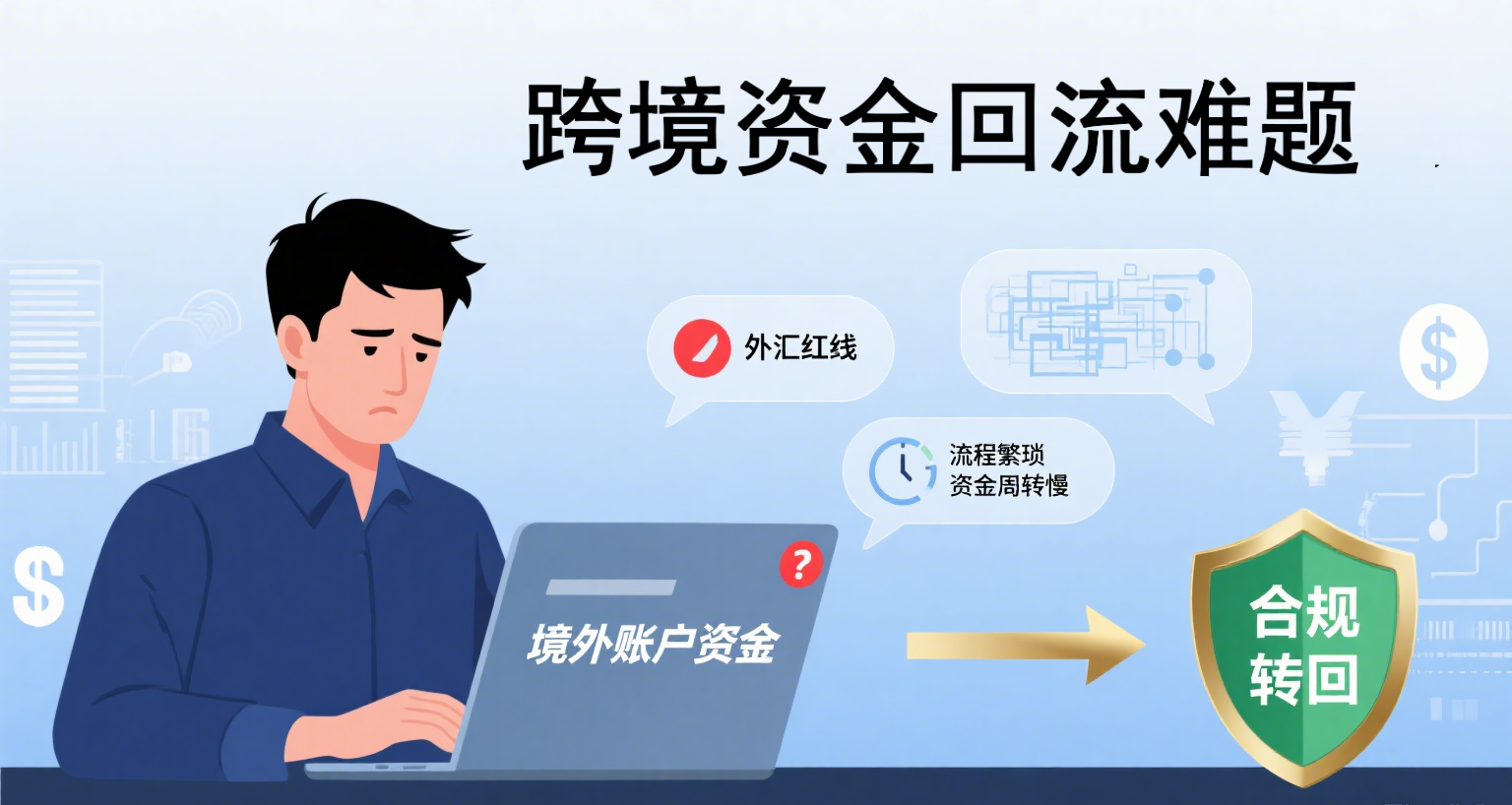
In fact, registering a company in Hong Kong and opening a Hong Kong bank account is precisely the "key bridge" to solve this problem - as an international financial center, Hong Kong has loose foreign exchange control and close economic and trade connection policies with the mainland, which can help you achieve capital return more efficiently. Today, we will combine the latest policies to teach you how to safely transfer overseas funds back to China through a Hong Kong company and a compliant path.
First, understand: Why are Hong Kong companies the "preferred tool" for capital return?
Before delving into the specific methods, let's first clarify the core advantages of Hong Kong companies to help you understand why they can be of assistance
1. Foreign exchange freedom: Hong Kong bank accounts have no foreign exchange control. Multiple currencies such as the US dollar, euro, and RMB can be freely transferred without the annual limit of 50,000 US dollars as in personal accounts on the Chinese mainland.
2. Tax advantages: Hong Kong has few tax types and low tax rates. The corporate profits tax rate is only 16.5% (the tax rate for the first 2 million profits is as low as 8.25%), and there is no value-added tax or capital gains tax, which can reduce the tax cost after the capital flows back.
3. Connecting with mainland policies: Hong Kong and the mainland enjoy policy support such as the CEPA Agreement and Cross-border RMB Settlement. The funds of Hong Kong companies can be smoothly connected to the accounts of mainland enterprises or individuals through compliant channels such as trade and investment.
4. Strong credibility: Hong Kong has established a solid financial credibility by virtue of its well-developed legal and regulatory system and high international recognition. On this basis, Hong Kong bank accounts opened by institutions such as Bank of China (Hong Kong) and HSBC can efficiently connect to the global payment network, significantly simplify the cross-border fund transfer process and reduce intermediate links, further confirming the reliable credibility of the Hong Kong financial system.
In simple terms: Registering a Hong Kong company and opening a Hong Kong bank account is equivalent to installing a "compliant transfer station" for your overseas funds. It not only enables flexible management of multi-currency funds but also connects to the return channels from the mainland.
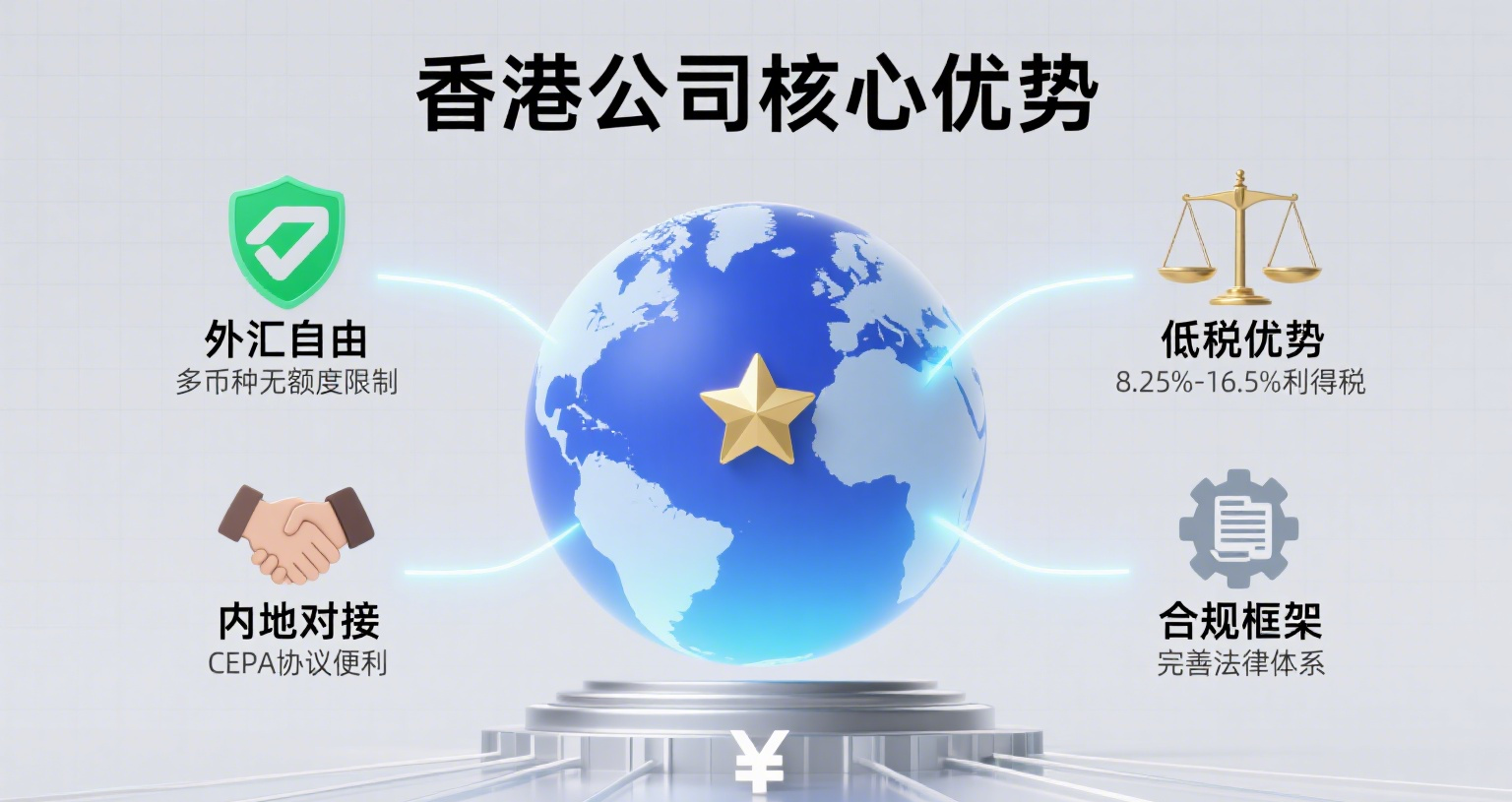
Second, the association of Hong Kong company seven compliance return path
1. Cross-border trade settlement (suitable for enterprises with actual business)
If you conduct import and export business through a Hong Kong company (for example, purchasing goods from overseas and then selling them to mainland companies), the funds can be handled in this way:
First, complete the registration and account opening of the Hong Kong company
Overseas customers will transfer the payment to your Hong Kong company account (multiple currencies are acceptable, with no limit on the amount).
A Hong Kong company signs a formal trade contract with a mainland company, issues a commercial invoice, and indicates the purpose of "goods trade".
Transfer funds through a Hong Kong bank to the corporate foreign exchange settlement account of a mainland company (which needs to be opened in advance at a mainland bank).
When mainland companies go to the bank to handle foreign exchange settlement, they need to provide consistent documents for the "customs declaration form, bill of lading and invoice". Even if the single transaction exceeds 50,000 US dollars, no additional approval is required (as long as the transaction is genuine).
Advantages: Fully complies with the requirements of "Foreign Exchange management under the Current Account", has no compliance risks, and Hong Kong companies can enjoy a low tax rate, reducing the overall tax burden.
2. Profit dividends of Hong Kong companies (Dividends for mainland individuals/enterprises)
If a Hong Kong company makes a profit and wants to distribute it to shareholders (individuals or enterprises) on the Chinese mainland, it can do so through "dividend distribution"
The prerequisite is that the Hong Kong company has completed the audit. Before distributing dividends, profits tax must be paid with the Inland Revenue Department of Hong Kong (a tax payment certificate will be obtained after completion).
A Hong Kong company held a shareholders' meeting and issued a "Profit Distribution Resolution", clearly stating the amount of dividends and the proportion of shareholders.
Hong Kong banks remit funds from their Hong Kong company accounts to the mainland based on "audit reports, tax payment certificates, and dividend resolution documents".
If the shareholder is a mainland enterprise: Remit the funds to the company's public account, with the note "Dividend Distribution". A 10% withholding income tax is required (there is a tax treaty between the mainland and Hong Kong, which can be deducted based on the Hong Kong tax payment certificate, and the actual tax burden may be lower).
If the shareholder is an individual from the Chinese mainland: The funds should be remitted to the individual's foreign exchange account. Within the limit of 50,000 US dollars per person per year, direct foreign exchange settlement is allowed. For the excess amount, a "Hong Kong company audit report, dividend resolution, and proof of kinship" must be provided (if multiple people receive dividends, avoid concentrating the remittance to one person to prevent it from being identified as "split foreign exchange settlement").
3. ODI round-trip Investment (Suitable for Hong Kong companies investing in the Chinese mainland)
If your Hong Kong company wants to transfer funds back to the mainland to start a company or build a factory, it can achieve compliant return through the "Overseas Direct Investment ODI" filing
First, handle the ODI filing with the National Development and Reform Commission and the Ministry of Commerce of the Chinese mainland (the registration documents of the Hong Kong company, the audit report and the project plan of the Chinese mainland need to be provided), and obtain the "Overseas Investment Filing Certificate".
A Hong Kong company remits funds to the "Foreign-Invested Enterprise" account in the Chinese mainland through a Hong Kong bank (it is necessary to register a foreign-funded company in the Chinese mainland, with the business scope consistent with the filing).
The funds can be used for the operation, procurement, investment, etc. of mainland companies. No additional approval is required when converting foreign exchange (ODI filing documents are sufficient).
Advantages: It is a "compliant channel under the capital account", with flexible use of funds (which can be used for equity investment and project construction), and some regions in the Chinese mainland (such as Qianhai in Shenzhen and the Shanghai Free Trade Zone) offer tax incentives for ODI return investment (such as "two years of exemption and three years of reduction by half").
4. Cross-border service trade (suitable for companies providing technical/consulting services)
If Hong Kong companies provide services (such as technical support) to mainland enterprises, funds can flow back through "trade in services" :
Hong Kong companies sign a "Service Agreement" with mainland enterprises, clearly defining the service content and charging standards (which must be in line with the fair market price to avoid "dual contracts").
Mainland enterprises should first submit the "Tax Filing Form for Foreign Payments of Service Trade and Other Items" on the electronic tax bureau (filing is required for single transactions exceeding 50,000 US dollars, and it can be completed online within one working day).
After the Hong Kong company provides the service, it issues a "service invoice", and the mainland enterprise remits the service fee to the account of the Hong Kong company.
If a Hong Kong company wants to transfer this sum of money back to the mainland, it can do the opposite: if the Hong Kong company provides services to its affiliated company in the mainland and then remits the funds back, it still needs to provide the service agreement and invoice.
Note: For service-related transactions, it is necessary to retain "service process proof" (such as communication records, delivery result documents) to avoid being identified as "false services".
5. With the help of "Cross-border Wealth Management Connect" (suitable for personal investment/does not occupy a $50,000 quota)
If you are a resident of the Chinese mainland and hold overseas assets (such as stocks and funds) through a Hong Kong company, you can combine the "Cross-border Wealth Management Connect" policy to bring them back.
Open a "Wealth management account" in a Hong Kong bank in the name of a Hong Kong company (some banks support binding company accounts to Wealth Management Connect).
Purchase compliant overseas wealth management products (such as Hong Kong stocks and bond funds) through a Hong Kong company;
After redeeming the wealth management products, the funds will first return to the company account in Hong Kong, and then be remitted to the personal foreign exchange account in the mainland through the "Cross-border Wealth Management Connect Northbound" channel (note "Wealth Management Redemption Funds").
Advantages: It does not occupy an individual's annual quota of 50,000 US dollars, and the entire process of fund circulation is subject to supervision, ensuring strong compliance.
6. Hong Kong company payment + mainland repayment (suitable for emergency small funds)
If individuals or enterprises on the Chinese mainland have small emergency capital needs (such as paying for goods or travel expenses), they can indirectly return the funds through the "agency payment" of a Hong Kong company.
The Hong Kong company makes payment to the overseas supplier from its own account, with the note "Payment for goods on behalf of XX Company in the mainland".
Mainland companies, based on the "agency payment agreement and supplier invoice", remit RMB funds to the mainland associated account of the Hong Kong company (or remit the funds to the Hong Kong company's account after settlement through the bank) to complete the "repayment".
Note: It is recommended that the single transaction amount be no more than 300,000 US dollars, and the payment agreement and the fund flow voucher must be kept to avoid being identified as "fund disassembly".
This year, Qianhai in Shenzhen and Hong Kong have expanded the pilot program of "Digital RMB Cross-border Payment". Hong Kong companies can use this new tool to return funds.
Hong Kong companies open "Digital RMB wallets" at pilot banks such as Bank of China (Hong Kong) and China Construction Bank Asia.
Mainland partners (enterprises/individuals) also need to open digital RMB wallets (all pilot banks within the country can handle this).
Hong Kong companies convert their account funds into "Digital RMB" through Hong Kong banks and deposit them into digital wallets.
Transfer the funds to the digital wallet of the mainland partner through the digital RMB platform based on the "transaction contract and invoice".
Mainland partners can directly use digital RMB for consumption or exchange it into RMB through banks and deposit it into their accounts.
Advantages: Real-time arrival, no intermediary bank fees, and exchange rate locking (avoiding exchange rate difference losses), suitable for small and frequent capital flows.

If you want to return funds through a Hong Kong company, "registration + account opening" is the first step. These two steps are the most prone to pitfalls, so be sure to pay attention:
1. Avoid the company's "hollowing out" and retain business evidence
Don't choose unlicensed intermediaries to register a Hong Kong company with no actual business just to save trouble. You will be questioned by banks and tax authorities when opening an account and bringing back funds later.
After registration, you need to keep: the director's appointment certificate, the shareholder's capital contribution certificate, and the office address lease contract (you can find a local secretary company in Hong Kong to provide a compliant address). These are all essential documents for account opening and auditing.
2. Prepare three types of core materials in advance for opening an account to increase the approval rate
Business proof: It must be genuine! For instance, cooperation contracts with overseas clients, past bills of lading/customs declaration forms, and bank statements (if any) can prove that you have actual cross-border business.
Director's personal information: ID card, Hong Kong and Macao Pass, personal bank statement (within the last 6 months to prove personal qualifications)
Company documents: Registration certificate, business registration certificate, and proof of legal secretary (provided by a Hong Kong secretary company).
3. Follow-up Maintenance: The company is not "registered and then left unattended"
An annual audit must be conducted: The Inland Revenue Department of Hong Kong will conduct spot checks. If no audit is conducted or a false audit is carried out, a fine or even the license may be revoked.
File profits tax returns on time: Even if the company incurs losses, it is still necessary to make returns.
Active bank account: Hong Kong banks will clean up "long-term zero transaction" accounts. It is recommended that there be at least 1-2 normal transactions per month.
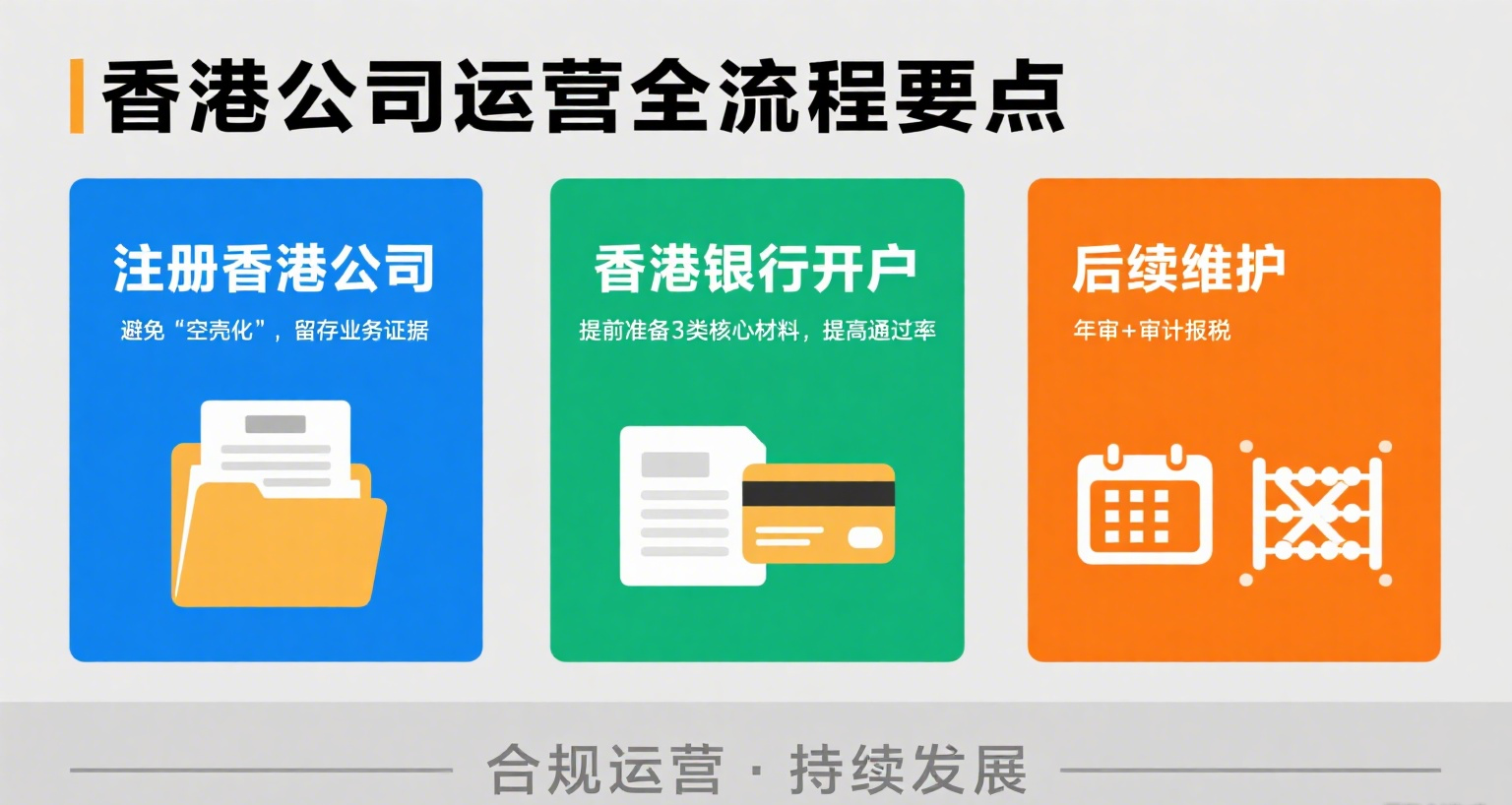
Four. Compliance is essential: These operations must never be touched!
1. False trade/services: Forging contracts and invoices, using "idle funds" to pass off as trade proceeds. Once the bank verifies that the "three documents are inconsistent", it will trigger an anti-money laundering investigation.
2. Splitting foreign exchange settlement: Splitting large sums of money into multiple transactions (such as involving more than five relatives) and settling foreign exchange through an individual's $50,000 quota will be detected by the foreign exchange administration through "big data monitoring" and regarded as "evading supervision".
3. Inconsistent use of funds: It is clearly trade funds, but is marked as "loan" or "gift", or "funds of unknown origin" are received through a Hong Kong company account (such as remittances from overseas individuals without reasonable reasons).
4. Direct investment without ODI filing: If a Hong Kong company transfers funds back to the mainland for investment without filing, it is considered "illegal cross-border capital flow" and will be punished by the National Development and Reform Commission.
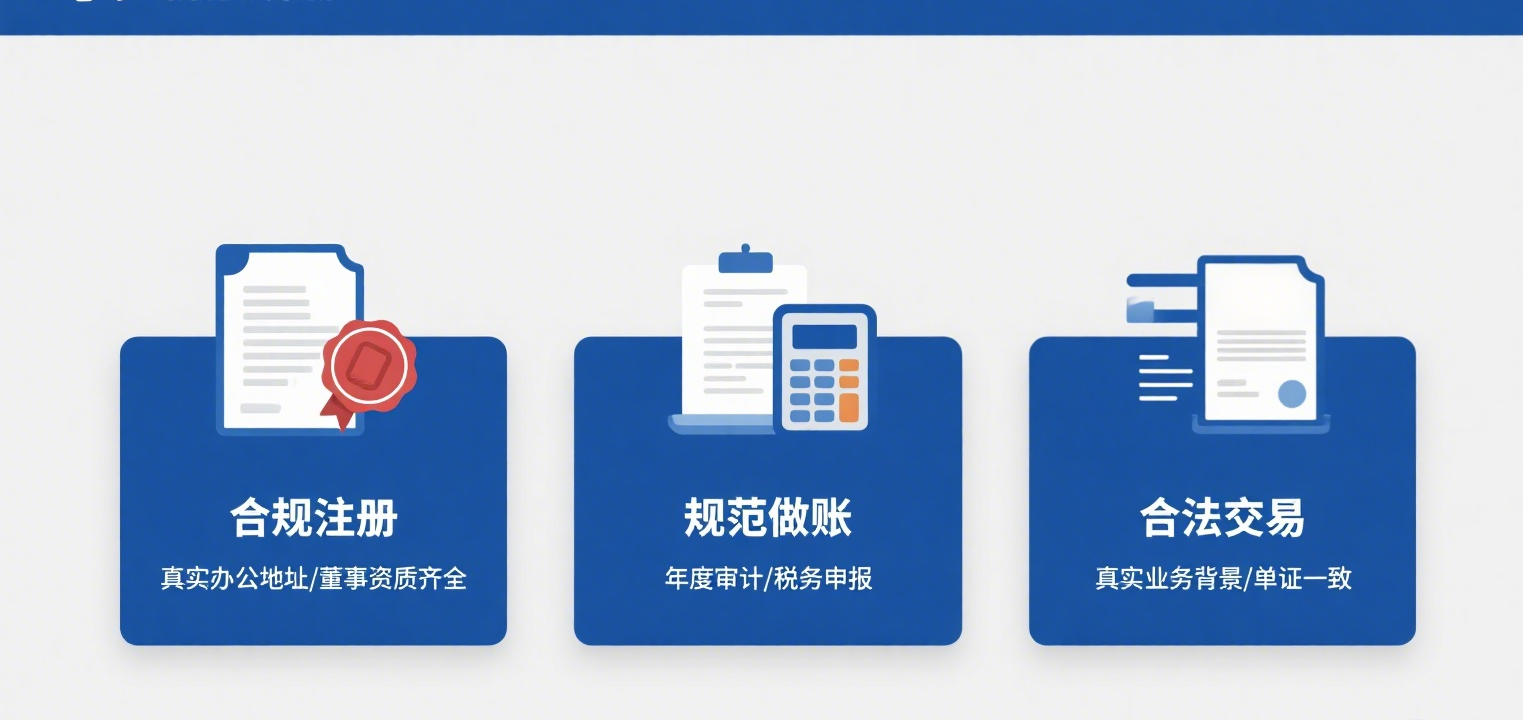
Five, advice to friends with different needs
If you are a cross-border e-commerce seller: Prioritize the "Trade Settlement" path. After registering a company in Hong Kong, activate "Amazon Global Payment", directly transfer the payment from the overseas platform to the Hong Kong account, and then remit it back to the mainland in compliance with regulations.
If you are an overseas investor: By making a return investment through "ODI filing + Hong Kong company", you can not only enjoy the policies of the free trade zone in the Chinese mainland but also manage your overseas funds flexibly.
If you are a shareholder of a Hong Kong company: Distribute dividends after the annual audit is completed, and keep the tax payment certificate well to avoid the risk of "profits flowing back without tax payment".
Compliance is the prerequisite for capital return, and a Hong Kong company is the best tool to help you achieve "compliance + efficiency" - choose the right path and make good preparations, and overseas funds can be safely in your pocket!
If you need to customize a dedicated plan for "Hong Kong company registration + account opening + capital return", or want to know the specific account opening policies of certain banks, you can contact the number below or long press to add wechat. We will arrange a professional cross-border finance and tax manager to connect with you, helping you avoid pitfalls and improve efficiency.
